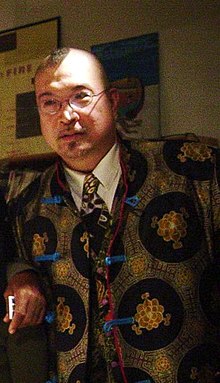Fred Ho
This article includes a list of references, related reading, or external links, but its sources remain unclear because it lacks inline citations. (April 2014) |

Fred Ho (Chinese: 侯维翰; pinyin: Hóu Wéihàn; born Fred Wei-han Houn; August 10, 1957 – April 12, 2014) was an American jazz baritone saxophonist, composer, bandleader, playwright, writer and Marxist social activist. In 1988, he changed his surname to "Ho".[1] He was born in Palo Alto, California.
Biography
While he is sometimes associated with the Asian American jazz or avant-garde jazz movements, Ho himself was opposed to the use of term "jazz" to describe traditional African American music because the word "jazz" was used pejoratively by white Americans to denigrate the music of African Americans.[1] In his role as an activist, many of his works fuse the melodies of indigenous and traditional Asian and African musics, which as Ho would have said[citation needed] is the music of the majority of the world's people. [citation needed]
Ho also co-edited two books: Legacy to Liberation: Politics and Culture of Revolutionary Asian Pacific America and Sounding Off! Music as Subversion/ Resistance/ Revolution. He had a third book in progress about African Americans and Asians working together in civil rights, which he was co-writing with Purdue University professor of African American studies Bill Mullen.
Ho's contributions to the Asian American empowerment movement are varied and many. He is credited with co-founding several Asian American civic groups such as the East Coast Asian Students Union (while a student at Harvard), the Asian American Arts Alliance in New York City, the Asian American Resource Center in Boston, and the Asian Improv record label.
Of Chinese descent, Ho specialized in the combining sometimes asynchronous tunes and melodies of various musical traditions, creating what many have described as both brilliant and chaotic sounds. He was the first to combine Chinese opera with traditional African American music. He lead the Afro Asian Music Ensemble (founded in 1982) and the Monkey Orchestra (founded in 1980). He lived in the Greenpoint section of Brooklyn, New York.
Ho held a B.A. degree in sociology from Harvard University (1979). He has recorded for the Koch Jazz and Soul Note labels. Some of his most recent works include Deadly She-Wolf Assassin at Armageddon, which premiered in Philadelphia, Pennsylvania in June 2006, Voice of the Dragon I, II, and III. As Ho was a prolific composer, writer, playwright, his list of works grew continually. Some of his first CDs include Monkey 1, Monkey II, The Underground Railroad to My Heart (Soul Note), We Refuse To Be Used And Abused, and Tomorrow is Now!
In his 2000 book, Legacy to Liberation, [2]
Ho, recapitulating an aesthetic vision first presented in 1985, wrote:
"Revolutionary art must ... inspire a spirit of defiance, or class and national pride to resist domination and backward ideology. Revolutionary art must energize and humanize; not pacify, confuse and desensitize...
"I am adamantly against one-dimensional, so called "correct" proscriptive forms that petty bourgeois critics try to label as "political art." I'm also not in favor of the errors of socialist-realist art with its glorified "socialist heroes", but favor imaginative critical realism, a sensuous rendering of the colorful material world. Art can fill us with love, with hope and with revolutionary vision.
"Ultimately society must be transformed through the organization of people for socialist revolution. Artists can contribute a critique of capitalist society. This is critical realism: to criticize appearances and obscured social relations ... Artists play key roles in affecting consciousness and can help to transform the working class from a class-in-itself to a class-for-itself."[3]
On August 4, 2006, Ho was diagnosed with colon cancer. After chemotherapy, his health improved, but a second tumor was found on September 24, 2007. [4] In 2009, he received the Harvard Arts Medal.[5] Ho died on April 12, 2014, aged 56.[6]
Discography
2010: Innova Recordings/Big Red Media 788 - "Deadly She-Wolf Assassin At Armageddon! (soundtrack)/Momma's Song"
See also
References
- ^ a b Ratliff, Ben (April 12, 2014). "Fred Ho, Saxophonist, Composer and Radical Activist, Dies at 56". New York Times. Retrieved April 13, 2014.
- ^ [1] New York Times Boxer’s Tale, Fashioned by a Fighter, Fred Ho and the ‘Sweet Science Suite’
- ^ Ho, Fred Wei-han & Carolyn Antonio. Legacy to Liberation: Politics and Culture of Revolutionary Asian Pacific America. AK Press, 2000; ISBN 1-902593-24-3/ISBN 978-1-902593-24-1, p. 387.
- ^ Ho, Fred (December 7, 2007). "Cancer Diary". Autonomedia. Retrieved January 15, 2008.
- ^ "Harvard Arts Medalist named: Composer, musician Fred Ho '79 honored" (Press release). Harvard University. October 13, 2009. Retrieved April 4, 2013.
- ^ [2] Wold Famous Saxophone player Fred Ho Performs his final performance at the Brooklyn Academy of Music (BAM) October 11-12, 2013.
External links
- Discover Fred Ho, a Transmedia Project Featuring the Documentary, Fred Ho's Last Year
- [http://www.bigredmediainc.com Big Red Media, Inc. website
- Fred Ho papers, University of Connecticut
- Voice of the Dragon website
- NewMusicBox cover: Fred Ho in conversation with Frank J. Oteri, October 8, 2008 (includes video)
- Avant-garde jazz musicians
- 1957 births
- 2014 deaths
- Asian-American movement activists
- American activists
- American dramatists and playwrights of Asian descent
- American musicians of Chinese descent
- American writers of Chinese descent
- American jazz composers
- American jazz baritone saxophonists
- Harvard University alumni
- Marxist writers
- Musicians from Palo Alto, California
- Guggenheim Fellows
